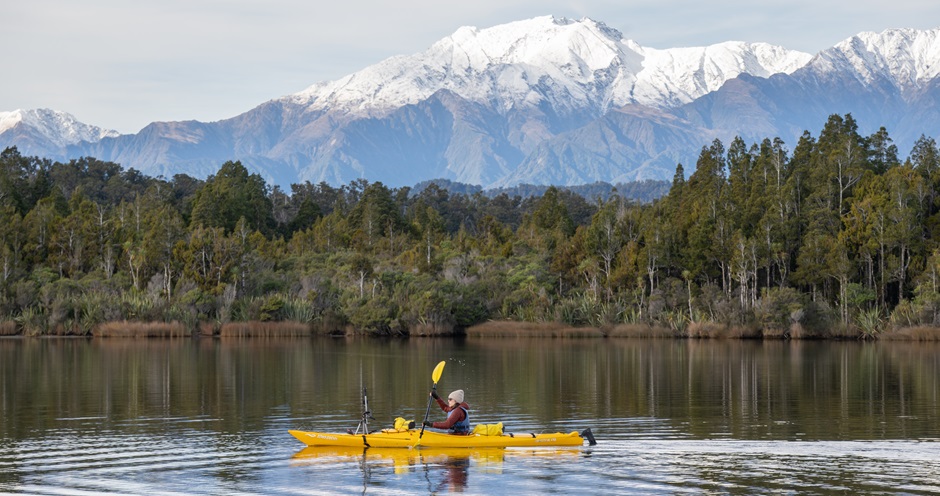Creating a new and sustainable tourism model

He karapitipitinga mariko – Immersive regenerative tourism experiences in Aotearoa, uses virtual and mixed-reality technologies to:
- Enable tourism without travel
- Enhance local-based tourism
- Reduce carbon emissions from international travel
- Open up environmentally sensitive areas in a safe manner
- Allow tangata whenua to be in control of how their knowledge is shared
This five-year research programme will create a technology-supported ‘new tourism’ model and radically transform the sector to address Aotearoa’s need for a more sustainable tourism industry.
He karapitipitinga mariko will play a key role in addressing challenges of an industry that contributed more than 10% to GDP in 2019.
Addressing tourism's systemic issues
While tourists, tourism operators, and destination managers are emerging from the impact of the COVID-19 pandemic, it is timely to address the serious systemic issues that were already confronting tourism.
Post-pandemic tourism must be more sustainable and resilient, while limiting and reversing damage caused to fragile cultural and natural heritage and their kaitiaki.
There will be no return to the ‘old tourism’. The current crisis offers both the challenge and the opportunity to build a new regenerative tourism model.
Exploring Aotearoa in new ways
The focus is on novel interactive and immersive live tourism experiences that can be jointly experienced with others regardless of location – either virtually being there or by augmenting the experience when physically visiting tourism sites. This can complement the existing tourism offering and provide new commercial opportunities, as well as solve access issues and associated inequalities.
Social, cultural, and environmental sustainability
This project brings together academic leaders in tourism, indigenous knowledge, and immersive technology. We work in partnership with the tourism industry, government agencies and local communities.
We aim to innovate the sector and build a tourism future that is economically more productive and resilient. It will empower communities that are disproportionately affected by unsustainable tourism.
Our work will enhance tourism’s social, cultural and environmental sustainability, and will capture memories that last long after the physical experience of the destination has ended.
Our people
The Ministry of Business, Innovation and Employment (MBIE) has awarded a five-year Endeavour Research Programme to the University of Otago and partner organisations:
Professor Holger Regenbrecht, Principal Investigator
Theme Leader: Creating virtual engagement and remote ‘being there’ experiences
School of Computing
Ōtākou Whakaihu Waka | University of Otago
Email holger.regenbrecht@otago.ac.nz
Distinguished Professor James Higham, Theme Leader: Engagement, aspirations, experiences and applications
Department of Tourism, Sport and Hotel Management
Griffith University
Email j.higham@griffith.edu.au
Professor Hēmi Whaanga, Theme Leader: Innovation in technology for the future generations
Te Pūtahi-a-Toi
Te Kunenga Ki Pūrehuroa | Massey University
Email h.whaanga@massey.ac.nz
Professor Stephan Lukosch, Theme Leader: Augmenting and sharing touristic physical "being there" experiences
Human Interface Technology Laboratory
Te Whare Wānanga o Waitaha | University of Canterbury
Email stephan.lukosch@canterbury.ac.nz
Professor Mark Billinghurst, Key individual
Bioengineering Institute
Waipapa Taumata Rau | University of Auckland
Email mark.billinghurst@auckland.ac.nz
Dr Kevin Shedlock, Key researcher
School of Engineering and Computer Science
Te Herenga Waka | Victoria University of Wellington
Email kevin.shedlock@vuw.ac.nz
Professor Tobias Langlotz, Key researcher
Department of Computer Science
Aarhus University
Denmark
Email tobias.langlotz@cs.au.dk
Associate Professor Stefanie Zollmann, Key researcher
Department of Computer Science
Aarhus University
Denmark
Emailstefanie.zollmann@cs.au.dk
Associate Professor Heide Lukosch, Key individual
Human Interface Technology Laboratory
Te Whare Wānanga o Waitaha | University of Canterbury
Email heide.lukosch@canterbury.ac.nz
Dr Jacob Young, Postdoctoral Fellow
School of Computing
Ōtākou Whakaihu Waka | University of Otago
Email jacob.young@otago.ac.nz
Kerian Varaine, Assistant Research Fellow
School of Computing
Ōtākou Whakaihu Waka | University of Otago
Email kerian.varaine@otago.ac.nz
Dr Hao Chen, Postdoctoral researcher
Bioengineering Institute
Waipapa Taumata Rau | University of Auckland
Email hao.chen@auckland.ac.nz
Dr Kris Tong, Postdoctoral Fellow
Human Interface Technology Laboratory
Te Whare Wānanga o Waitaha | University of Canterbury
Email kris.tong@canterbury.ac.nz
Qinyang Wu, PhD student
Human Interface Technology Laboratory
Te Whare Wānanga o Waitaha | University of Canterbury
Email qinyang.wu@pg.canterbury.ac.nz
Jackie Rees, Programme Manager
School of Computing
Ōtākou Whakaihu Waka | University of Otago
Email jackie.rees@otago.ac.nz